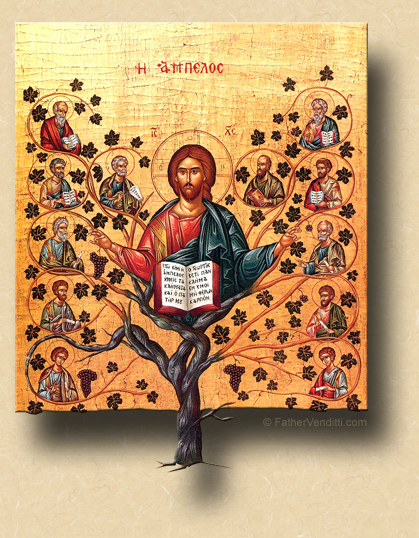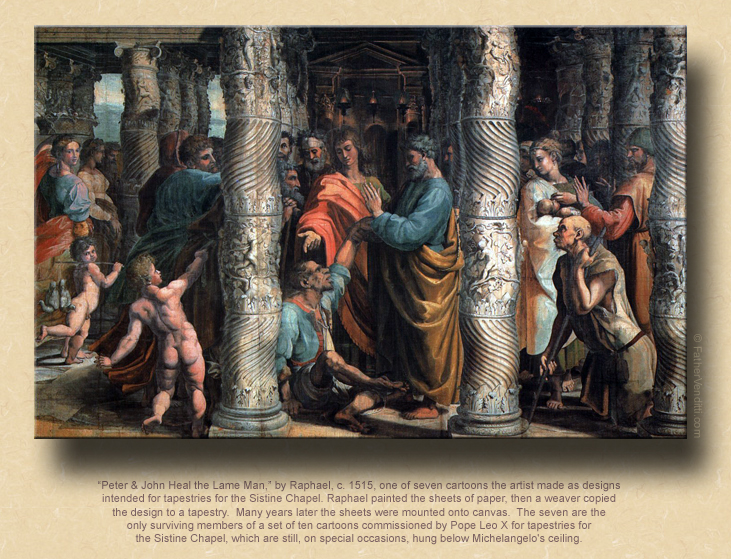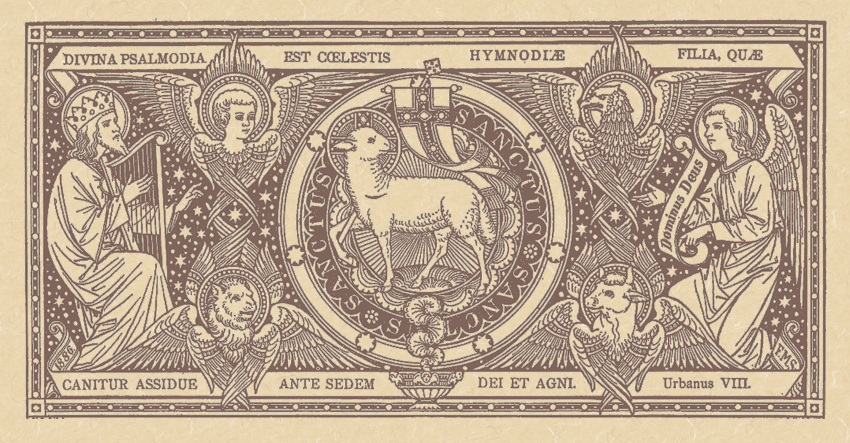What We Have Seen and Heard.
Easter Saturday.
Lessons from the octave, according to the ordinary form of the Roman Rite:
• Acts 4: 13-21.
• Psalm 118: 1, 14-21.
• [Sequence (optional)] Victimæ paschali laudes…*
• Mark 16: 9-15.
Lessons from the octave, according to the extraordinary form of the Roman Rite:
• I Peter 2: 1-10.
• [Gradual]**
• [Sequence] Victimæ paschali laudes…*
• John 20: 1-9.
FatherVenditti.com
|
 3:14 PM 4/27/2019 — During this Easter Octave we’ve been reading about three appearances of our Risen Lord: our Lord's encounter with the two disciples on the road to Emmaus, His appearance to the apostles in Jerusalem, and yesterday's early morning breakfast with the apostles by the Sea of Tiberias where they all first met three years before. But, during this time, an entirely different narrative has been taking place during the Octave in the Apostolic lessons from the Acts of the Apostles, beginning on Wednesday with the cure of a cripple by Peter and John, with the following day's lessons devoted to Peter's speech after the pair are arrested for doing it. Those lessons were presented because they represent a very early—the earliest, in fact—theological exposition on the nature of our Lord's bodily resurrection. Both narratives wrap up in the lessons of today's Mass, and the whole beautiful presentation of our Lord's glorious resurrection is brought to completion tomorrow with the well-known appearance of our Lord in the upper room, and the proof of His resurrection to Thomas. 3:14 PM 4/27/2019 — During this Easter Octave we’ve been reading about three appearances of our Risen Lord: our Lord's encounter with the two disciples on the road to Emmaus, His appearance to the apostles in Jerusalem, and yesterday's early morning breakfast with the apostles by the Sea of Tiberias where they all first met three years before. But, during this time, an entirely different narrative has been taking place during the Octave in the Apostolic lessons from the Acts of the Apostles, beginning on Wednesday with the cure of a cripple by Peter and John, with the following day's lessons devoted to Peter's speech after the pair are arrested for doing it. Those lessons were presented because they represent a very early—the earliest, in fact—theological exposition on the nature of our Lord's bodily resurrection. Both narratives wrap up in the lessons of today's Mass, and the whole beautiful presentation of our Lord's glorious resurrection is brought to completion tomorrow with the well-known appearance of our Lord in the upper room, and the proof of His resurrection to Thomas.
One of the points I hope you have noticed—in addition to the esoteric one's we been reflecting on—is that almost all of the post-resurrection appearances of our Lord end with some form of apostolic mandate. To Mary Magdalene, the first to see Him risen, Jesus says, “Return to my brethren, and tell them this; I am going up to him who is my Father and your Father, who is my God and your God” (John 20: 17 Knox). To the other women who were the next to meet Him, he says, “Do not be afraid; go and give word to my brethren to remove into Galilee; they shall see me there” (Matt. 28: 10 Knox). The two disciples at Emmaus aren't given a command in words, but were certainly moved that very night to run to the apostles and tell them what had happened (cf. Luke 24: 35). The only post-resurrection appearance of our Lord that doesn't include an apostolic mandate is the one on the beach we read of yesterday, where the only thing our Lord commands the apostles to do is have breakfast.
Today's Gospel lesson, of course, is the summation, in which is contained the great apostolic mandate which will continue in force for all time: “And he said to them, 'Go out all over the world and preach the gospel to the whole of creation; he who believes and is baptized will be saved; he who refuses belief will be condemned'” (Mark 16: 15-16 Knox).  And from that moment on, the apostles began to bear testimony to that which they had seen and heard, and preached repentance and the forgiveness of sins in His name to all the nations, beginning in Jerusalem (cf. Luke 24: 44-47). And from that moment on, the apostles began to bear testimony to that which they had seen and heard, and preached repentance and the forgiveness of sins in His name to all the nations, beginning in Jerusalem (cf. Luke 24: 44-47).
Take note of the fact that, not long after this, in the very beginning of the Acts of the Apostles, when the time comes to pick a replacement for Judas, one of the conditions is that the candidate be someone who was a personal witness to the resurrection (1: 21-22), and that's because it is a firm belief in the resurrection—in the truth of the faith—that gives any and every apostolic endeavor its fuel. In today's lesson from Acts 4, the members of the Sanhedrin who had arrested Peter and John following the cure of the cripple weren't of a malicious mind; they wanted to let them go. All they required in exchange for their freedom was that they stop preaching the resurrection of our Lord which was, for obvious reasons, so upsetting to those who had been complicit in our Lord's death. In other words, they had to stop preaching the truth. The apostles' reply, of course, is boilerplate—“Are we supposed to obey you or God?” (cf. 4: 19)—that is, until Peter adds the line, “It is impossible for us to refrain from speaking of what we have seen and heard” (v. 20 Knox).
In other words, their preaching is not based on intellectual conviction—the scribes themselves remarked on the fact that they were “uneducated, ordinary men”—nor is it based on some emotional experience. Their preaching is based, quite simply, on the fact that they saw our Lord alive! Tomorrow, we will hear our Lord tell Thomas, “Blessed are those who have not seen and have believed” (John 20: 29 NABRE), and we accept that because our Lord said it; but on the other hand, if you've actually seen it, case closed! There's just nothing further to discuss.
Beginning with the Apostle James, all of the apostles, save one, would end up dying a martyr's death. Comparatively speaking, it was easy for them to make that choice; the truth they were dying for was not something they read in a Bible, or learned in a seminary somewhere, or embraced in the emotion of the moment after hearing a particularly dynamic speaker or attending some sort of over-emotionalized retreat experience. They could die for the truth because they had actually seen the truth; it was as plain to them as the noses on their faces. In this sense, the martyrs which followed them, from sub-apostolic times to the present, had a much tougher choice to make, because they weren't yet born when our Lord rose, and didn't see it first hand. And yet, the truth was still just as clear to them as it was to the apostles, or else they wouldn't have died like they did.
It remains for us to continue to challenge ourselves to always remember that, while we may be separated from our Lord's apostles by many centuries, we still hear Him every day in his word, and see Him every day in His Most Blessed Sacrament. Should not, then, the truth of the faith be just as clear to us now as it was to them?

And when someone is able to refrain from speaking of it, it can only be because that person no longer sees and hears;—he no longer believes—and, all of his protestations about kindness and mercy and inclusion and what he calls charity ring very hollow, especially in the face of those who have died—and are now dying—for the truth of what they so clearly still see and hear. They are not cardinals and bishops, they are not theologians or even popes. They are exactly what the Sanhedrin observed about Peter and John: “uneducated, ordinary men” (v. 13), but men who had seen and heard and, therefore, believed.
It remains for us, who are neither threatened with martyrdom—at least not in the flesh, though we do have our own little struggles every day—nor being asked to decide the great issues of the Church in our day, to continue to challenge ourselves to always remember that, while we may be separated from our Lord's apostles by many centuries, we still hear Him every day in his word, and see Him every day in His Most Blessed Sacrament. Should not, then, the truth of the faith be just as clear to us now as it was to them?

* "Christians! to the Paschal Victim offer your thankful praises. The Lamb the sheep redeemeth: Christ, Who only is sinless, reconcileth sinners to the Father. Death and life contended in that conflict stupendous: the Prince of Life, Who died, deathless reigneth. Speak, Mary, declaring what Thou sawest wayfaring: 'The tomb of Christ Who now liveth: and likewise the glory of the Risen. Bright Angels attesting, the shroud and napkin resting. Yea, Christ my Hope is arisen: to Galilee He goeth before you.' We know that Christ is risen, henceforth ever living: Have mercy, Victor King, pardon giving. Amen. Alleluia."
** In the extraordinary form of the Roman Rite, from this day until the end of Eastertide, the Gradual Psalm is omitted.
|

